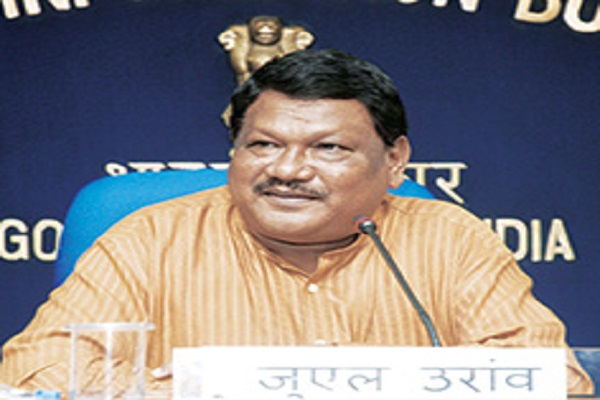
Even as the world has moved on to the digital age, the tribal people lag behind in various areas of human activity. Union Minister for Tribal Affairs Jual Oram, in an interview with Elets News Network (ENN)’s Gautam Debroy, talks about the steps the Narendra Modi-led Government has initiated for the welfare of the tribal community in the country
What are your thrust areas as the Minister of Tribal Affairs?
My focus is on overall growth of the tribal people in the country. The condition of the tribal people in the sectors of education, health, communication, electricity, etc., must be improved. In addition to that, we have to promote their culture and language and also empower them politically.

The programmes and schemes of the Ministry are intended to support the efforts of other central ministries, state governments and voluntary organisations through financial assistance, and fill critical gaps taking into account the condition of Scheduled Tribes.
The Ministry also supplements the efforts of various developmental interventions in critical sectors through specially-tailored schemes. These, comprising schemes for economic, educational and social development, are administered by the Ministry of Tribal Affairs and implemented through state governments, Union Territory administrations and voluntary organisations.

How do you find the present status of the tribal people of the country?
Well, take education, for instance. The overall national literacy rate is 72 per cent and the tribal literacy rate is 58 per cent. It means the tribal literacy rate is 14 per cent below the national average.
Similarly, the tribal people are lagging behind in the primary health and education sector as well. We have adopted several steps to better their condition in these sectors.
Earlier, the gap in the literacy rate was very huge. However, with several steps being adopted by the new regime, we hope that the differences would be minimised.
Do you have any special plan for the tribal people living in Naxal-affected areas?
Countering Naxalism is the responsibility of the Union Home Ministry. It is true that the people living in Naxalaffected areas are deprived of development, education and proper health facilities. As our Ministry is implementing various development schemes, we are trying to win over the people living in those backward areas.
The tribal people are basically polite and innocent. Talking and mixing up with them helps you win their hearts. So, we are trying to implement several development schemes through our ministry for the welfare of those living in the Naxal-affected areas.
Do you think that the previous regime at the Centre failed to emancipate the tribal people?
I think the previous UPA Government, during its 10 long years’ tenure, failed to bring overall development to the tribal people. That is why, out of the 36 tribal seats in the last general elections, the Congress could hardly win two or three seats, while BJP and its allies bagged most of the seats. Also, the vote percentage of BJP in tribal areas was huge.
The result of the last general elections shows that the UPA Government did nothing for their welfare.
In fact, the present government is also considering the demand of several communities from Assam to give them tribal status. A community needs to have five basic features to get the tribal status — primitive trends, distinct culture, socio-economic condition, economic condition and their geographical location. But, our government is going to make some changes in the criteria by giving some relaxation in the norms.
We need political will for that. We have decided to bring an amendment to the Tribal Act, so that the communities, which are deprived of the tribal status, get the ST tag.
During a summary revision of the tribal community in India, we had scheduled 270 communities under the tribal category when the government was led by former Prime Minister Atal Bihari Vajpayee. We are once again considering to grant the tribal status to over 150-200 communities.
How will you implement the Direct Benefit Transfer (DBT) schemes in the tribal-dominated areas?
Well, our Ministry has identified schemes like the Post- Matriculation Scholarship (PMS) for ST students, Top Class Education Scholarship and Rajiv Gandhi National Fellowship (RGNF) for Direct Benefit Transfers to beneficiaries in the identified districts.
On the basis of directions given by this Ministry, the concerned states and Union Territories as well as implementing agencies have started disbursing the scholarships directly into the bank accounts of the beneficiaries in the identified districts (34 districts with ST population out of the identified 43).
A community needs to have five basic features to get the tribal status — primitive trends, distinct culture, socioeconomic condition, economic condition and their geographical location. But, we are going to relax the norms.
How important is implementation of IT in your Ministry?
Information Technology is very important for our Ministry. With the use of IT, we can monitor proper implementation of the tribal welfare schemes. Our government is giving huge emphasis on the IT sector, and accordingly, all the central ministries have started working on proper utilisation of IT.
Be a part of Elets Collaborative Initiatives. Join Us for Upcoming Events and explore business opportunities. Like us on Facebook , connect with us on LinkedIn and follow us on Twitter, Instagram.











